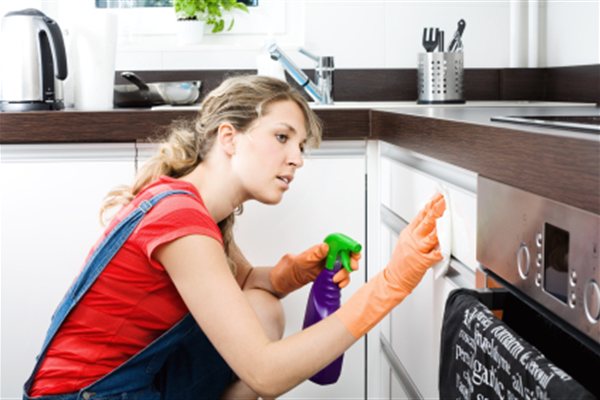Kitchen cleaning tips from the professionals

The kitchen is perhaps the most contaminated and bacteria ridden place in your home. Treating these sorts of problems fast will insure the health and well-being of you and your family and pets. Many people however, due to lack of knowledge and understanding, don’t clean their kitchen properly – leaving room for disease and microscopic parasites to thrive and multiply.
There are numerous ways to deal with this problem; some more complicated than others. Being a deep cleaning professional, I understand the plight of the everyday housekeeper. But I also know what is the best, most effective way to clean your kitchen with little to no investment involved!

Before you can ever start cleaning, there are a few things that must be done in order to maximize productivity. First of all you need to formulate a cleaning strategy that is both logical and effective. I suggest going from top to bottom. So the first thing you need to take care of is the ceiling, the ceiling corners, cabinets, air-conditioning, vents, windows and only then can you move on to your appliances, cooking surfaces and lastly the floors. Of course you also want to clean behind the kitchen appliances as well. It is a good idea to find a friend or a family member who is going to help you move the hardware around.
Figure out what tools you will be using on your quest for cleanliness. Usually they are a few universal tools that every cleaner should have: broom; mop, rag, bucket, soft brush, hard brush, duster a tooth brush for that special finishing touch. You would also need a pair of gloves, a face mask, hair protection and eye protection if you feel it’s necessary.
If you are going to come prepared, you better do it right. Choosing the right detergents is as much as a profession as it is art. I personally would suggest purchasing bleach, ammonia, soap, oven degreaser and perhaps some baking soda. The bleach and ammonia in combination with water are used to decontaminate floors and hard, metallic surfaces. Beware however that ammonia is pretty dangerous and you should always wear protective gear and clean in a well-ventilated area.
Soap will take care of lighter stains, spots, grease etc. Use baking soda-water paste (about 50/50) in combination with the tooth brush to clean difficult to reach places, grouts and crevices.
If you don;t want to spend your whole weekend cleaning a kitchen that can be done in few hours by a professional, you must learn how to do two things at the same time. The most important thing is to match the tools with the detergents. For example if you are cleaning your stove with a metal scrubber and degreaser, would would want to thoroughly clean your cooker – from top to bottom. Don’t begin one task and jump to the next before having completed the first.
Don’t use too much water when cleaning your kitchen. The more water you introduce, the more likely a new wave of parasites will form a colony there. Also, you can use baking soda and some water and buff any metallic/reflective non-glass surfaces.
Author Bio: Connie Jameson works as a professional cleaner and knows how to clean one place properly. Her job at http://www.tidycleaning.co.uk/deep-cleaning-sw10-west-brompton/ gives her everything that she needs.
